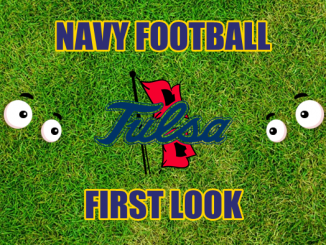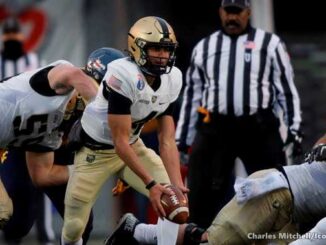
Army’s win over Navy won’t be shrouded in fog — or circumstances
The fog which enveloped West Point’s Michie Stadium on Saturday was in many ways a perfect metaphor — not just for the latest edition of the Army-Navy Game, but for this college football season, this very difficult year, and an American nation which has endured so much pain.
It is great that college football is closing in on playing a season in a pandemic. Athletes are getting to play the game they love, coaches are getting to coach the sport to which they have devoted decades of study. Television money is going to schools and conferences. Athletic departments — though definitely suffering due to a lack of ticket sales and other revenue streams — aren’t taking a complete loss. Yes, people who write about football also have work to do. Those are all blessings.
Yet, we can see and acknowledge the limitations and absences of college football in a pandemic: few fans, no bands, no cheerleaders on the field. The game goes on, but the pageantry, the electricity, the color and comfort aren’t what they normally are.
Plenty of fans I talk to online are grateful to have college football in their lives — it sure beats an autumn in which no games would have been played on any Saturday the past three months — but even they acknowledge that while they are glad the sport is being played, it’s just not the same.
It isn’t.
Games being moved around the schedule creates a dizzying effect which has taken college football’s soothing rhythms away from us. The great rivalries of the sport usually end the regular season and lead into the conference championship games. We don’t have that this year. In the case of Army-Navy, this game — normally given standalone showcase treatment — was instead accompanied by a lot of other late-season college football games.
Army-Navy is usually the only FBS college football game being played when it happens. This past Saturday, it was one of dozens of games.
The fog at Michie Stadium represented the lower visibility for this game. Again, the metaphor was perfect, if unpleasant.
Yet, what we learned about Army-Navy — in a way we haven’t quite learned before, at least not in modern times — is that no fog, and no alterations of a schedule, can obscure or diminish the emotional weight and power of this American sports classic.
Yes, this game wasn’t played before fans from the general public, but Army defeated Navy in West Point for the first time ever. Army got to sing second on its home turf. How special a memory that will be for every Army player and every West Pointer who took in the first on-campus Army-Navy game since 1943.
This game was marked by a goal-line stand from Army. When huge games are decided by goal-line stands, the authors of the feat often get remembered decades later.
Mention the name “Barry Krauss” to anyone in the state of Alabama older than 20, and they’ll know exactly who you are referring to: the man who made the goal-line stop for the Crimson Tide in the 1979 Sugar Bowl against Penn State, leading Alabama to a share of the national championship.
Mention the name “Dan Bunz” to any San Francisco 49er fans over 40, and they’ll tell you he is the man who stopped Charles Alexander of the Cincinnati Bengals inches short of the goal line in the third quarter of Super Bowl XVI, when the Niners won their first Super Bowl title.
Saturday, Army made a goal-line stand against Navy in the third quarter. Owning a precarious 3-0 lead, Army knew that if Navy punched the ball into the end zone, victory was going to be very difficult to achieve, given how well the Midshipmen’s defense had been playing.
After Cedric Cunningham prevented Navy quarterback Xavier Arline from scoring on a 52-yard run, the rest of the Army defense got to work. Having four plays from the Army 2-yard line, Navy couldn’t penetrate West Point’s defenses. On third down, linebacker Jon Rhattigan stopped Arline. On fourth down, linebacker Amadeo West stopped Navy fullback Nelson Smith.
Navy had only one more genuine chance to win the game after that point in time: on an Army fumble it tried to scoop and score, but failed to recover. Army then scored a touchdown for a 10-0 lead, and the game — for all intents and purposes — was over.
Navy’s defense played yet another strong game — the Midshipmen haven’t allowed 20 points in any of their last three contests — but Army’s defense stole the show. When Navy beat Army 14 straight times earlier this century, the Midshipmen always seemed to come up big on defense in red-zone situations. Now that Army has won four of the last five games against Navy, the pendulum has fully swung in the other direction.
So what if the nation was focusing — at least partly — on other college football games this past Saturday? Jon Rhattigan, Amadeo West, and also Cedric Cunningham will have a permanent, eternal place in Army football lore. In this historic Army-Navy Game — played on campus in one-of-a-kind circumstances — three young men joined their Army teammates in pitching a shutout of Navy. They’re going to remember and share this story the rest of their lives.
We can say that the fog over Michie Stadium was symbolically fitting… and yet we can note that no blanket of fog or any adjusted college football schedule could obscure or minimize the emotions felt by Army and Navy athletes when this game ended. Singing second not only felt as great as it ever has for the players and Jeff Monken; it probably felt even better on West Point soil this year.
Army will take a few days to revel in this richly deserved victory… but then the Black Knights have to prepare for Air Force and the game which will decide the 2020 Commander-In-Chief’s Trophy. The Falcons haven’t played since Dec. 3. Will they be fresh? Will they be rusty? We’ll find out soon enough.
One thing we can say for sure: Army’s defense will be ready for the visitors from Colorado Springs.




Be the first to comment